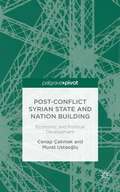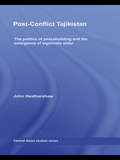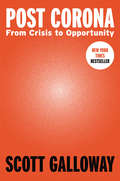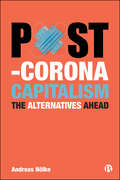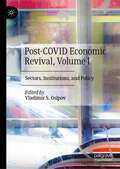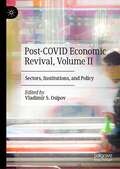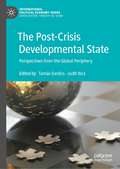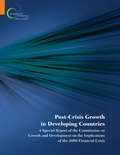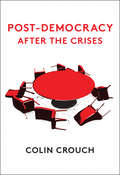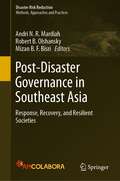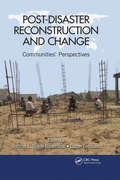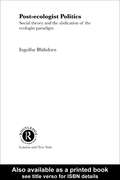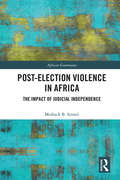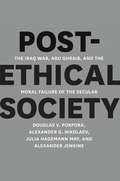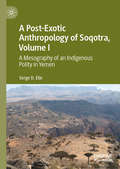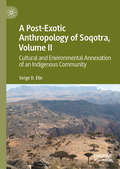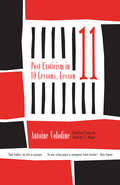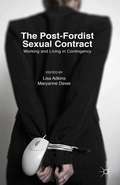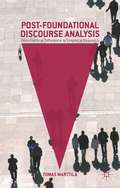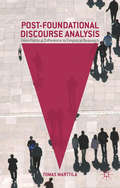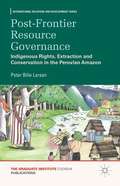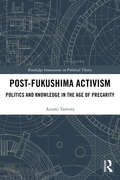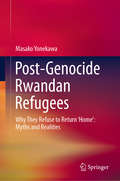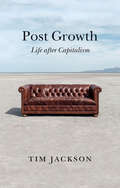- Table View
- List View
Post-Conflict Syrian State and Nation Building: Economic and Political Development
by Cenap Çakmak Murat UstaoğluBased on extensive field work involving the leading figures of the diverse Syrian National Coalition, an umbrella initiative of opposition groups fighting against the Assad regime, this study critically evaluates the challenges ahead as well as the inherent opportunities for the post-conflict era in Syria.
Post-Conflict Tajikistan: The politics of peacebuilding and the emergence of legitimate order (Central Asian Studies #Vol. 16)
by John HeathershawPost-Soviet, post-conflict Tajikistan is an under-studied and poorly understood case in conflict studies literature. Since 2000, this Central Asian state has seen major political violence end, countrywide order emerge and the peace agreement between the parties of the 1990s civil war hold. Superficially, Tajikistan appears to be a case of successful international intervention for liberal peacebuilding, yet the Tajik peace is characterised by authoritarian governance. Via discourse analysis and extensive fieldwork, including participant-observation with international organizations, the author examines how peacebuilding is understood and practised. The book challenges received wisdom that peacebuilding is a process of democratisation or institutionalisation, showing how interventions have inadvertently served to facilitate an increasingly authoritarian peace and fostered popular accommodation and avoidance strategies. Chapters investigate assistance to political parties and elections, the security sector and community development, and illustrate how transformative aims are thwarted whilst ‘success’ is simulated for an audience of international donors. At the same time the book charts the emergence of a legitimate order with properties of authority, sovereignty and livelihoods. Providing a challenge to the theoretical literature on peacebuilding and concentrating on an under-studied Central Asian state, this book will be of interest to academics working on Peace Studies, International Relations and Central Asian Studies.
Post Corona: From Crisis to Opportunity
by Scott Galloway"This is as good an analysis as you could wish to read." --The Financial TimesFrom bestselling author and NYU Business School professor Scott Galloway comes a keenly insightful, urgent analysis of who stands to win and who's at risk to lose in a post-pandemic worldThe COVID-19 outbreak has turned bedrooms into offices, pitted young against old, and widened the gaps between rich and poor, red and blue, the mask wearers and the mask haters. Some businesses--like home exercise company Peloton, video conference software maker Zoom, and Amazon--woke up to find themselves crushed under an avalanche of consumer demand. Others--like the restaurant, travel, hospitality, and live entertainment industries--scrambled to escape obliteration.But as New York Times bestselling author Scott Galloway argues, the pandemic has not been a change agent so much as an accelerant of trends already well underway. In Post Corona, he outlines the contours of the crisis and the opportunities that lie ahead. Some businesses, like the powerful tech monopolies, will thrive as a result of the disruption. Other industries, like higher education, will struggle to maintain a value proposition that no longer makes sense when we can't stand shoulder to shoulder. And the pandemic has accelerated deeper trends in government and society, exposing a widening gap between our vision of America as a land of opportunity, and the troubling realities of our declining wellbeing.Combining his signature humor and brash style with sharp business insights and the occasional dose of righteous anger, Galloway offers both warning and hope in equal measure. As he writes, "Our commonwealth didn't just happen, it was shaped. We chose this path--no trend is permanent and can't be made worse or corrected."
Post-Corona Capitalism: The Alternatives Ahead
by Andreas NölkeThe COVID-19 pandemic is a Rorschach test for society: everyone sees something different in it, and the range of political and economic responses to the crisis can leave us feeling overwhelmed. This book cuts through the confusion, dissecting the new post-coronavirus capitalism into several policy areas and spheres of action to inform academic, policy and public discourse. Covering all the major aspects of contemporary capitalism that have been affected by the pandemic, Andreas Nölke deftly analyses the impacts of the crisis on our socio-economic and political systems. Signposting a new era for global capitalism, he offers alternatives for future economic development in the wake of COVID-19.
Post-COVID Economic Revival, Volume I: Sectors, Institutions, and Policy
by Vladimir S. OsipovThis two-volume book examines the most important global problem—the recovery of the social-economic crises due to the COVID-19 pandemic. This economic crisis has its own basis and differs from others by the lockdown of most businesses on the decision of authorities. The uncertainty of the future economic revival obliges scientists around the world to unite in search of effective solutions that will become the basis for prosperity and human wellbeing.The death of millions of people around the world, several waves of coronavirus, and a global pandemic have forced most states to seek extraordinary measures to save people and revive economic activity. The world economy experienced a global shock, probably never experienced before due to lockdowns. The disruptions and gaps in the value chains were primarily caused by the lockdowns of enterprises. The change in the essence of the economic crisis has raised the question of how to overcome it and revive economic activity. The crisis caused a sharp decline in incomes of the population around the world, which led to social upheavals. Post-COVID economic revival in a globalized world has become the most important problem of our time. This book offers contributions of authors from different countries and explores problem solving in the fields of public administration (Volume I, Part I), financial services (Volume I, Part II), different branches (Volume II, Part III) and the social sector (Volume II, Part IV).The first volume discusses governmentality, public, and corporate management. The second part of the volume reveals the trends in the development of the financial sector in the post-COVID period. Despite the fact that the book is divided into two volumes and four parts, a holistic and systematic perception of the new reality of the post-COVID age can be obtained by reading the entire book. This book will be of interest to academics and practitioners in public administration and economics, particularly those who are interested in Post-COVID economic revival.
Post-COVID Economic Revival, Volume II: Sectors, Institutions, and Policy
by Vladimir S. OsipovThis two-volume book examines the most important global problem—the recovery of the social-economic crises due to the COVID-19 pandemic. This economic crisis has its own basis and differs from others by the lockdown of most businesses on the decision of authorities. The uncertainty of the future economic revival obliges scientists around the world to unite in search of effective solutions that will become the basis for prosperity and human wellbeing. The death of millions of people around the world, several waves of coronavirus, and a global pandemic have forced most states to seek extraordinary measures to save people and revive economic activity. The world economy experienced a global shock, probably never experienced before due to lockdowns. The disruptions and gaps in the value chains were primarily caused by the lockdowns of enterprises. The change in the essence of the economic crisis has raised the question of how to overcome it and revive economic activity. The crisis caused a sharp decline in incomes of the population around the world, which led to social upheavals. Post-COVID economic revival in a globalized world has become the most important problem of our time. This book offers contributions of authors from different countries and explores problem solving in the fields of public administration (Volume I, Part I), financial services (Volume I, Part II), different branches (Volume II, Part III) and the social sector (Volume II, Part IV). The second volume of the book is devoted problems in sectors of the economy, such as agriculture, tourism, aircraft, the automotive industry, electricity, culture, etc. The second part of the second volume examines trends in the revival in the social sector—medicine, pharmaceuticals, the labor market and social insurance. Despite the fact that the book is divided into two volumes and four parts, a holistic and systematic perception of the new reality of the post-COVID age can be obtained by reading the entire book. This book will be of interest to academics and practitioners in public administration and economics, particularly those who are interested in Post-COVID economic revival.
The Post-Crisis Developmental State: Perspectives from the Global Periphery (International Political Economy Series)
by Tamás Gerőcs Judit RiczThe focus of this volume is on the role of the developmental state in a situation in which a series of major crises affects the (semi-) periphery of the global economy. The authors go beyond the established debate on developmental states in East Asia by highlighting a much broader understanding of development and a very different global economic context. They also further the existing debate by covering new country cases. At the same time, they deepen our perspective on developmental states by looking at unusual sectors such as green industrial policy, education and farming.
Post-Crisis Growth in Developing Countries
by Commission on Growth and DevelopmentThe 2008 financial crisis has raised a number of questions about the best strategy for achieving sustained growth and poverty reduction in developing countries, foremost among them whether the failure of the financial system also signifies the broader failure of market-oriented capitalist systems. The Growth Commission believes that the crisis was not a failure of market-oriented systems and that an outward-looking strategy, as suggested in the original Growth Report (published in May 2008), remains broadly valid. The following questions are discussed in this special report: - How has the economic landscape changed in the wake of the financial crisis of 2008? - What factors contributed to the onset of the financial crisis and its transmission from advanced to developing countries? - Should the crisis be interpreted as a failure of financial-sector regulation or as a broader failure of market-based systems? - What effects will the financial crisis have on the prospects for economic growth in developing countries? - How will the crisis impact the formulation of developing country growth strategies going forward? - What is the outlook for free trade and a growth model that capitalizes on the global economy? - How do actions by the advanced economies in response to the crisis affect the choices of policy makers in the developing world? - What is the appropriate role of government in the post-crisis economy? - How will the lessons of the crisis affect strategies for financial-sector development in developing countries? - What are the prospects for improved international oversight of global finance and cross-border financial flows?
Post-Democracy After the Crises
by Colin CrouchIn Post-Democracy (Polity, 2004) Colin Crouch argued that behind the façade of strong institutions, democracy in many advanced societies was being hollowed out, its big events becoming empty rituals as power passed increasingly to circles of wealthy business elites and an ever-more isolated political class.Crouch’s provocative argument has in many ways been vindicated by recent events, but these have also highlighted some weaknesses of the original thesis and shown that the situation today is even worse. The global financial deregulation that was the jewel in the crown of wealthy elite lobbying brought us the financial crisis and helped stimulate xenophobic movements which no longer accept the priority of institutions that safeguard democracy, like the rule of law. The rise of social media has enabled a handful of very rich individuals and institutions to target vast numbers of messages at citizens, giving a false impression of debate that is really stage-managed from a small number of concealed sources. Crouch evaluates the implications of these and other developments for his original thesis, arguing that while much of his thesis remains sound, he had under-estimated the value of institutions which are vital to the support of a democratic order. He also confronts the challenge of populists who seem to echo the complaints of Post-Democracy but whose pessimistic nostalgia brings an anti-democratic brew of hatred, exclusion and violence.
Post-Disaster Governance in Southeast Asia: Response, Recovery, and Resilient Societies (Disaster Risk Reduction)
by Andri N. R. Mardiah Robert B. Olshansky Mizan B. F. BisriThis book aims to provide insight into how Southeast Asian countries have responded to disasters, recovered, and rebuilt. It investigates emergency response and disaster recovery cases at national levels and from regional perspectives. Recovery from great disasters poses great challenges to affected countries in terms of organization, financing, and opportunities for post-disaster betterment. Importantly, disasters are critical moments in which to achieve disaster risk reduction, especially in the context of climate change and Sustainable Development Goals. Insights from these cases can help other countries better prepare for response and recovery before the next disaster strikes. While the experiences of disaster risk reduction and climate change implementation in Southeast Asian countries have been well documented, tacit knowledge from emergency response and recovery from these countries has not been transformed into explicit knowledge. There are only a few books that integrate information and lessons from post-disaster governance in Southeast Asia as a region, and because of the importance of providing real and recent situations, this book will interest many policymakers, practitioners, and academics. The information presented here will lead to a better understanding of how to plan for future disasters and improve governance to ensure effective emergency response as well as encouraging a build back better and safer towards a more resilient and sustained recovery.
Post-Disaster Reconstruction and Change: Communities' Perspectives
by Jennifer E. Duyne Barenstein Esther LeemannSuccessful recovery following a disaster depends upon transcending the disciplinary divides of architecture, engineering, and planning and emphasizing the importance of community perspectives in the post-disaster reconstruction process. Effective results in community recovery mandate that we holistically examine the complex interrelationship betwee
Post-Ecologist Politics: Social Theory and the Abdication of the Ecologist Paradigm (Routledge Innovations in Political Theory)
by Ingolfur BlühdornSince the late 1980s, ecological thought and the European eco-movement have gone through a phase of fundamental transformation which has been widely acknowledged but not yet theorised in any satisfactory way. This important text questions why radical ecological criticism has had so little impact on contemporary society, despite the urgency of the issues it highlights. The book offers a challenging theoretical critique of ecological thought itself.
Post-EEG-Anlagen in der Energiewirtschaft: Praxishilfe für Energieversorgungsunternehmen und Anlagenbetreiber zum Umgang mit ausgeförderten Anlagen
by Marcel LinnemannBetreiber von Anlagen, die unter das EEG fallen, werden vor der Frage stehen, wie der weitere Betrieb sicherzustellen ist. Dieses Buch zeigt die Möglichkeiten zur Vermarktung solcher Anlagen für Energieversorger und Anlagenbetreiber auf, bespricht die Hintergründe sowie die Vertragsgestaltung. Messkonzepte für unterschiedliche Vermarktungskonzepte (Volleinspeisung, Überschusseinspeisung) sowie die regulatorische Einordung (Steuern, EEG Umlage ect.) sind ebenso berücksichtigt.
Post-Election Violence in Africa: The Impact of Judicial Independence (African Governance)
by Meshack SimatiThis book explores the effect of the judiciary on the incidence of post-election violence by political actors across Africa and within African countries. It examines how variation in judicial independence can constrain or incentivize election violence among democratizing states. Using case studies and cross-national analysis, the book shows that variation in levels of judicial independence from a non-independent judiciary to a quasi-independent judiciary or from a fully independent judiciary to quasi-independent judiciary increases the likelihood of strategic use of post-election violence by non-state actors. However, the likelihood of post-election violence is significantly reduced in non-independent judiciaries or once countries’ judiciaries become fully independent. The author makes the theoretical argument that, within unconsolidated states, non-state actors that view the judiciary as semi-independent are more likely to engage in post-election violence with the purpose of creating political and professional uncertainty in order to influence assertive behaviour from judges in disputed elections. Consequently, the book argues that semi-independent judiciaries or judiciaries that are neither fully controlled by the incumbent nor fully independent from the incumbent can help explain post-election violence among unconsolidated states, all else being equal. This book will be of interest to scholars of election violence, democratic politics, law and politics and African politics.
Post-Ethical Society: The Iraq War, Abu Ghraib, and the Moral Failure of the Secular
by Douglas V. Porpora Alexander Nikolaev Julia Hagemann May Alexander JenkinsWeve all seen the images from Abu Ghraib: stress positions, US soldiers kneeling on the heads of prisoners, and dehumanizing pyramids formed from black-hooded bodies. We have watched officials elected to our highest offices defend enhanced interrogation in terms of efficacy and justify drone strikes in terms of retribution and deterrence. But the mainstream secular media rarely addresses the morality of these choices, leaving us to ask individually: Is this right? In this singular examination of the American discourse over war and torture, Douglas V. Porpora, Alexander Nikolaev, Julia Hagemann May, and Alexander Jenkins investigate the opinion pages of American newspapers, television commentary, and online discussion groups to offer the first empirical study of the national conversation about the 2003 invasion of Iraq and the revelations of prisoner abuse at Abu Ghraib a year later. "Post-Ethical Society" is not just another shot fired in the ongoing culture war between conservatives and liberals, but a pensive and ethically engaged reflection of Americas feelings about itself and our actions as a nation. And while many writers and commentators have opined about our moral place in the world, the vast amount of empirical data amassed in "Post-Ethical Society "sets it apart--and makes its findings that much more damning.
A Post-Exotic Anthropology of Soqotra, Volume I: A Mesography of an Indigenous Polity in Yemen
by Serge D. ElieThis two-volume book offers a panoramic explanatory narrative of Soqotra Island’s rediscovery based on the global significance of its endemic biodiversity. This rediscovery not only engendered Soqotra’s protective environmental supervision by United Nations agencies, but also the intensification of its bureaucratic incorporation and political subordination by Yemen’s mainland national government. Together, the two volumes provide a “total” community study based on an historically contextualized and analytically detailed portrait of the Soqotran community via a multi-layered narrative the author terms a “mesography.” The first volume, A Post-Exotic Anthropology of Soqotra, Volume I: A Mesography of an Indigenous Polity in Yemen, situates the author’s study within the emergent configuration of the structures of knowledge production in the social sciences before moving onto a systematic identification of the constitutive aspects, pivotal vectors, and historical contexts of Soqotra’s transitioning polity. The second volume, A Post-Exotic Anthropology of Soqotra, Volume II: Cultural and Environmental Annexation of an Indigenous Community, explores how cultural modernization in the light of environmental annexation transforms communal possibilities, development models, environmental values, conservation priorities, cultural practices, economic aspirations, language preferences, livelihood choices, and other key social norms. The two volumes lay the social scientific foundations for the study of Soqotrans as an island-based indigenous community.
A Post-Exotic Anthropology of Soqotra, Volume II: Cultural and Environmental Annexation of an Indigenous Community
by Serge D. ElieThis two-volume book offers a panoramic explanatory narrative of Soqotra Island’s rediscovery based on the global significance of its endemic biodiversity. The first volume, A Post-Exotic Anthropology of Soqotra: A Mesography of an Indigenous Polity in Yemen initiated the analytical inventory of the four key vectors of Soqotra’s transition process through a discussion of the first two: economic disarticulation and political incorporation. This volume, A Post-Exotic Anthropology of Soqotra: Cultural & Environmental Annexation of an Indigenous Community completes the analytical inventory by exploring the other two pivotal vectors of transition: cultural modernization and environmental annexation. These two vectors encompass the critical sociocultural spheres and environmental domains in which Soqotra’s transformation process is unfolding. The origin of these vectors is situated within Soqotra’s long history of exogenous mediations by external actors and their symbolic appropriation of the island into an imaginative geography. The legacy is a “symbolic curse," which has made Soqotra into an ideal playground for fantasist cultural or environmental experiments. Accordingly, this volume undertakes, first, a systematic inventory of the communal effects engendered within the domains of cultural modernization: dissonant linguistic attitudes, alienating consumption practices, divergent religious affiliations, and differentiating economic aspirations. Second, it anatomizes the process of environmental annexation through the reconstruction of the formulation and implementation process of a biodiversity conservation and sustainable development experiment in which the island and its residents are appropriated into an anachronistic paradigm – a pastoral ecotopia – as a blueprint of their future.
Post-Exoticism in Ten Lessons, Lesson Eleven
by J. T. Mahany Antoine Volodine"The interconnected works of Volodine--think Faulkner, but after an apocalypse--constitute the most exciting project in contemporary French literature."--Maria ClementiThat is what we had called post-exoticism. It was a construction connected to revolutionary shamanism and literature. . . . It was an interior construction, a withdrawal, a secret welcoming land, but also something offensive that participated in the plot of certain unarmed individuals against the capitalist world and its countless ignominies. This fight was now confined solely to Bassmann's lips.Like with Antoine Volodine's other works (Minor Angels, We Monks & Soldiers), Post-Exoticism in Ten Lessons, Lesson Eleven takes place in a corrupted future where a small group of radical writers--those who practice "post-exoticism"--have been jailed by those in power and are slowly dying off. But before Lutz Bassmann, the last post-exoticist writer, passes away, a couple journalists will try and pry out all the secrets of this powerful literary movement.With its explanations of several key "post-exoticist" terms that appear in Volodine's other books, Lesson Eleven provides a crucial entryway into one of the most ambitious literary projects of recent times: a project exploring the revolutionary power of literature.Antoine Volodine is the author of dozens of books under a few different pseudonyms, including Lutz Bassmann and Manuela Draeger. These novels--several of which are available in English--articulate a post-exoticist universe filled with secrets, revolutionary writers, and spiders.J. T. Mahany is a graduate of the University of Rochester's MA in Literary Translation Studies program and is currently enrolled in the MFA program at the University of Arkansas.
The Post-Fordist Sexual Contract: Working and Living in Contingency
by Lisa Adkins Maryanne DeverThis collection analyzes shifting relationships between gender and labour in post-Fordist times. Contingency creates a sexual contract in which attachments to work, mothering, entrepreneurship and investor subjectivity are the new regulatory ideals for women over a range of working arrangements, and across classed and raced dimensions.
Post-Foundational Discourse Analysis: From Political Difference to Empirical Research
by Tomas MarttilaPost-Foundational Discourse Analysis.
Post-Foundational Discourse Analysis: From Political Difference to Empirical Research
by Tomas MarttilaThis book adds the missing link between post-foundational discourse theory and the methods of empirical research, and in doing so it develops a post-foundational discourse analysis research program. The book offers a structure of the research program, and explores the methodologization of other discourse analytical approaches.
Post-frontier Resource Governance
by Peter Bille LarsenThe 20th century involved an unprecedented scramble for resources reaching the most remote corners of the world. Simultaneously, a quiet revolution has taken place with environmental protection, land and community rights regimes gradually taking hold, albeit unevenly, across the global South. Institutional topographies and policies have never before appeared as green and socially inclusive, yet co-exist with a deepening socio-environmental crisis. Intensified pressures stand in contrast to,persist, and even thrive under new environmental and social protection measures. The author offers an anthropological analysis of the paradox. Building on the concept of post-frontier governance, he presents a portrayal of the host of new regulatory technologies, practices and institutions that nominally close, yet more accurately characterize and restructure, contemporary resource frontiers. The book examines these arrangements ethnographically in the Peruvian Amazon by focusing on the Y#65533;nesha people and their involvement with the organization of indigenous rights, conservation and protected area planning, logging, and oil development.
Post-Fukushima Activism: Politics and Knowledge in the Age of Precarity (Routledge Innovations in Political Theory)
by Azumi TamuraPolitical disillusionment is widespread in contemporary society. In Japan, the search for the ‘outside’ of a stagnant reality sometimes leads marginalised young people to a disastrous image of social change. The Fukushima nuclear disaster was the realisation of such an image, triggering the largest wave of activism since the 1960s. The disaster revealed the interconnected nature of contemporary society. The protesters regretted that their past indifference to politics prefigured such a catastrophe and became motivated to protest in the streets. They did not share any totalising ideology or predetermined collective identity. Instead, the activism provided a space for each body to encounter others who forced them to feel and think, which also introduced an ethical dimension to their politics. In this book, Azumi Tamura proposes a concept of politics as a series of endless experiments based on creative responses to unexpected forces. Instead of searching for a transcendental reference for politics, she investigates an immanent force within individuals that motivates them to become involved in political action. Referencing Deleuzian philosophy, Tamura provides a different epistemological and ontological approach to the social movement studies. She suggests social movements themselves generate knowledge about how one may live better in a complex society and where our lives are exposed to uncertainty. This knowledge is neither empirical knowledge, nor normative political theory of ‘how we should live’. Instead, social movements bring affective knowledge into politics as they offer a space for experimenting with ‘how we might live.’ The encounter with such knowledge galvanizes our desire for ‘how we want to live’ and encourages new experiments.
Post-Genocide Rwandan Refugees: Why They Refuse to Return ‘Home’: Myths and Realities (Springerbriefs In Political Science Ser.)
by Masako YonekawaThis book highlights the repeated refusal of post-genocide Rwandan refugees to return ‘home’ and why even high-profile government officials continue to flee to this day. This resistance has taken place for a lengthy period in spite of the fact that genocide ended 25 years ago and the government of Rwanda and the United Nations have assured security in the country. Based on interviews conducted with a number of refugees living in Africa, Europe, and North America, the book explains the high degree of fear and trauma refugees have experienced in the face of the present Rwandan government that was involved in the genocide and other serious crimes both in Rwanda and the neighboring Democratic Republic of Congo. With this book, refugee policies and implementation of the United Nations and some host countries in Africa must be questioned. Some exiles have been stripped of their refugee status in early 2018 and host countries may refoul the refugees back to Rwanda, counter to the principle of non-refoulement (“no expulsion of refugees to a high-risk country”), the cornerstone of asylum and of international refugee law. “Forced migration is at the heart of the peacebuilding, conflict and insecurity challenges of the Great Lakes region of Africa. Refugee flows between the DRC and Rwanda have epitomized the human misery of contemporary armed conflict, in particular in the 1990s. Masako Yonekawa provides unique insights that are both politically compelling and deeply moving at the human level. It is written by someone with firsthand experience of the tragedy, and it effectively demonstrates that the humanitarian crisis of forced migration in the region was also a political crisis and a failure of international engagement. It is essential reading for anyone wishing to understand this difficult episode.” Edward Newman, Professor, School of Politics and International Studies, University of Leeds
Post Growth: Life after Capitalism
by Tim Jackson‘Empowering and elegiac’Yanis Varoufakis, author of Another Now‘Utterly inspiring’Caroline Lucas, MP, Green Party‘A masterpiece of measured rage and love’Jonathan Porritt, author of Hope in Hell Capitalism is broken. The relentless pursuit of more has delivered climate catastrophe, social inequality and financial instability – and left us ill-prepared for life in a global pandemic. Tim Jackson’s passionate and provocative book dares us to imagine a world beyond capitalism – a place where relationship and meaning take precedence over profits and power. Post Growth is both a manifesto for system change and an invitation to rekindle a deeper conversation about the nature of the human condition.
